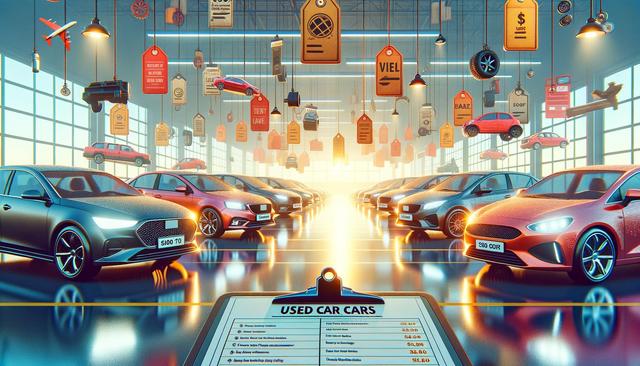Researching the Right Used Car for Your Needs
Before visiting dealerships or browsing listings, it’s essential to clarify what you’re looking for in a vehicle. Consider your daily driving habits, fuel efficiency requirements, passenger and cargo space, and any specific features like all-wheel drive or advanced safety technology. Making a checklist of your must-haves helps narrow down your options when exploring used cars for sale near me. This upfront research saves time and helps you avoid being overwhelmed by too many choices.
There are many online tools and resources that let you compare different models by year, mileage, and average price. Look for reliability ratings, owner reviews, and known issues for the model years you’re considering. You may also want to explore:
- Vehicle history reports for accident and maintenance records
- Average resale values to determine if the price is fair
- Cost of ownership including insurance, taxes, and maintenance
By taking the time to research, you’ll be better prepared to identify vehicles that offer long-term value and performance without stretching your budget.
Setting a Realistic Budget and Exploring Financing
Establishing a budget is a crucial step when buying second hand cars. It’s not just about how much you can afford to spend upfront, but also what you can comfortably handle in terms of ongoing costs. Include registration fees, insurance premiums, fuel costs, and potential maintenance or repairs in your calculations. If you’re financing the vehicle, get pre-approved for a loan so you understand your spending limit before you start shopping.
Used car prices can vary greatly depending on the age, mileage, and condition of the vehicle. To make the most of your money, consider vehicles that are a few years old, as they may still have modern features but come with a lower price tag due to depreciation. When exploring options, be sure to compare:
- Private seller vs. dealer prices
- Certified pre-owned vehicles with warranties
- Promotions or financing deals that may be available
Being financially prepared not only strengthens your negotiating position but also helps you avoid stretching beyond your means for a feature or brand name that isn’t essential.
Inspecting and Test Driving the Vehicle
One of the most critical steps in purchasing a used car is performing a thorough inspection and taking a test drive. Whether you’re browsing online listings or visiting a dealership, never skip this step. Even if a car looks great on paper, it’s important to assess its actual condition in person. While looking for used cars for sale near me, prioritize opportunities to see the car yourself and check for signs of wear, rust, or hidden damage.
Bring along a knowledgeable friend or hire a mechanic to help you with the inspection. Pay attention to:
- Exterior condition: scratches, dents, tire wear
- Interior wear: seat condition, dashboard warning lights
- Mechanical signs: strange noises, fluid levels, battery health
During the test drive, evaluate the driving experience in different conditions such as city streets and highways. Test the brakes, steering, acceleration, and alignment. Don’t hesitate to ask questions about any concerns you notice. A well-maintained second-hand car should feel stable and responsive without unusual vibrations or sounds.
Understanding Vehicle History and Legal Documentation
Before finalizing a deal, it’s vital to verify all the legal and historical details of the vehicle. A comprehensive vehicle history report can reveal important information about past ownership, accident history, service records, and title status. This is especially important when buying second hand cars, as it helps protect you from purchasing a car with hidden issues or legal complications.
Always ask for and review the following documents:
- Title and registration papers
- Service and maintenance records
- Vehicle Identification Number (VIN) report
If the seller hesitates to provide these, it may be a red flag. Additionally, verify that the odometer reading matches the reported mileage and that there are no liens on the vehicle. For added peace of mind, some buyers opt for certified pre-owned vehicles, which often come with thorough inspections and limited warranties.
Being diligent during this phase reduces the risk of unexpected surprises after the purchase and ensures a smoother ownership experience.
Negotiating the Deal and Finalizing the Purchase
Once you’ve found a vehicle that meets your needs and budget, it’s time to negotiate the final price. Start by researching the market value for similar vehicles in your area and use that information to support your offer. When looking at used cars for sale near me, you’ll often find that pricing can vary based on location, dealer reputation, and vehicle condition.
Be polite but firm during negotiations. It’s helpful to:
- Point out any flaws or maintenance issues as leverage for a lower price
- Ask for additional perks like a free oil change or extended warranty
- Be ready to walk away if the terms don’t meet your expectations
Once a price is agreed upon, review the contract carefully. Ensure all verbal agreements are documented in writing. If you’re trading in a vehicle, confirm the trade-in value and how it affects the final cost. After signing, make sure you receive all necessary documents, including a bill of sale, title transfer, and any warranty paperwork.
Taking your time during this process can lead to a more satisfying purchase and help you avoid buyer’s remorse.
Conclusion: Making a Smart Choice in 2025
Buying a used car in 2025 can be a rewarding experience when approached with preparation and attention to detail. From setting a realistic budget to investigating used cars for sale near me, every step plays a role in finding a vehicle that suits your lifestyle without compromising financial stability. The process of buying second hand cars has evolved, with more tools and transparency available than ever before, making it easier to make informed decisions.
By following these expert tips, you’ll be well-positioned to find a reliable, well-maintained vehicle that meets both your practical and personal preferences. Patience, research, and a willingness to ask questions are your greatest assets in this journey. Whether it’s your first car or an upgrade, a thoughtful approach ensures you drive away with confidence and value.




Leave a Reply